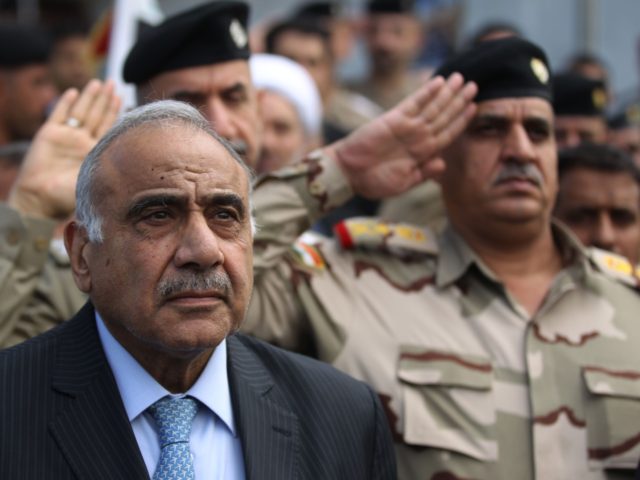Iraqi Prime Minister Adel Abdul-Madhi announced his resignation on Friday in an address broadcast on state television. He did not specify exactly when his resignation would take effect, but the Iraqi parliament will meet on Sunday to begin the process of choosing a successor.
Iraq has been swept by massive protests for the past two months, met by a deadly response from security forces reportedly supervised by Iranian Gen. Qassem Soleimani. Iran’s influence over Iraqi politics is a major complaint of the protest movement.
An estimated 400 people have been killed and over a thousand injured during the demonstrations, some by live fire from security officers, including rooftop snipers.
Abdul-Mahdi’s resignation announcement referenced a call for him to step down from Iraq’s highest-ranking Shiite cleric, Grand Ayatollah Ali al-Sistani. Sistani warned after an exceptionally bloody day on Thursday that Iraq is teetering on the brink of civil war and urged parliament to “reconsider its choices” in standing behind Abdul-Madhi and his administration.
“In response to this call, and in order to facilitate it as quickly as possible, I will present to parliament a demand for my resignation from the leadership of the current government,” he said.
The high body count of 44 dead on Thursday came after protesters stormed the Iranian consulate in Najaf, shouting accusations that Abdul-Madhi remained in office only because Iran was propping him up. Tehran ordered Abdul-Madhi to crack down on the demonstrators and he complied, sending in military forces to “impose security and restore order.”
When the bodies started piling up, public outrage grew to a fever pitch, and the United Nations expressed concerns about the bloodshed, the prime minister fired the commander in charge of the operation and the regional governor resigned, but it was too late to contain the political damage, as lawmakers had already begun planning for an emergency session to hold a no-confidence vote on Sunday.
Jubilant protesters set off fireworks over Baghdad’s Tahrir Square on Friday and chanted “Iran out!” as word of the prime minister’s resignation spread.
Deutsche Welle saw Sistani’s successful ouster of the prime minister as a devastating blow to Iran’s ambitions, noting that Sistani has enormous influence over Iraqi Shiite political parties, and at least one Iran-backed Shiite militia openly swore allegiance to Sistani instead of Tehran after the grand ayatollah gave the sermon that called for Abdul-Mahdi to step down.

COMMENTS
Please let us know if you're having issues with commenting.